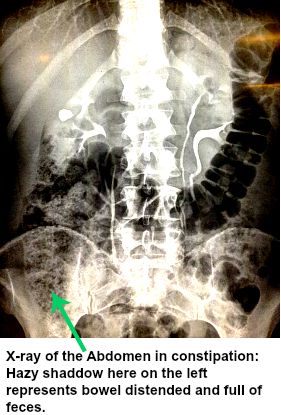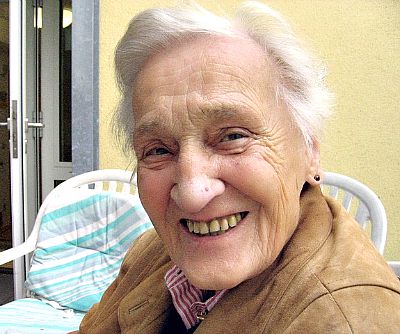Constipation Symptoms
Understanding Constipation Symptoms And How They Vary In Newborn Babies, Infants, Toddlers, Teenagers, Young Adults, And The Elderly.
Constipation symptoms include abdominal pain or discomfort, bloating, passing of excessive amount of foul smelling gas or intestinal wind, infrequent passage of hard stools, or intermittent passage of liquid stools with very pungent smell. The symptoms of constipation actually varies from one age group to the
other. Constipation itself is not a disease. It is often a sign that
something is not going on well in our digestive tract. See common
symptoms of constipation in newborn babies, infants, toddlers and young
children, teenagers, young adults and the elderly.

Constipation is the passage of hard or firm stool or the infrequent passage of stool – whether hard or normal constituency.
From the time we are born, our individual and unique bowel opening pattern starts to develop.
The number of times we open our bowel a day or a week, is influenced by the balance of our gut flora, whether we were breastfed for formula fed, food types introduced into our diet, family and psychological nurturing, how our immune system process the component of food that goes into our bowel –whether they trigger diary or food allergies, and a host of other factors.
The following are well recognized patterns of change in bowel habit as we grow from being a newborn to the elderly.
- New born babies who are breast fed opens their bowel after every time they feed. Thus they could open their bowel up to 6 times. This is normal.
- Newborn babies who are formula fed opens their bowel 2 to 4 times daily and this may be normal for them. As they grow older (after month three), the frequency of their bowel motions may reduce to once or twice every day or every other day.
- Between ages 3 to 12 months, as new food begins to be introduced into their diet, infants then to open their bowel even less frequently, but certainly no less than 3 times in a week.
- By the age of 12 months, most children would have established their pattern of bowel movement.
- During the 2nd and 3rd year when most kids are potty trained, they could come up with reduced frequency of bowel motion, initially due to associated anxiety of being potty trained if they are not “ready” for it leading to stool holding behaviours and triggering a vicious cycle of events including pain on defecation, anal fissure etc, leading to even worsening constipation.
- In Young children and adolescence, a firm pattern of bowel habit would have been formed which is often carried into later adulthood. Menstruation and menopause as well as pregnancy and ovarian issues could affect patterns of bowel movement
- In late adulthood or the elderly, due to reduced food and or water intake, inactivity and often being on lots of medications, the frequency of bowel opening could reduce even further, leading to constipation.
So, the message in all the above is that bowel habits vary from one point in our life to the other. Also, not passing stool every day does not mean that you are constipated.
You must learn to recognize and work with the right or usual frequency of bowel opening for you, your baby or your loved one.
Let us look at constipation symptoms across the various age groups. For simplicity, we shall classify age groups into: Newborn babies (0 to 3 months), Infants (3 to 12 months), Toddlers (1 to 3 years), older Children (3 to 12 years), Teenagers and Adults, The Elderly.
Constipation Symptoms in Newborn Babies
- Newborn babies are expect to open their bowel immediately following birth or at least within the first 24 hours. Failure to do so indicates that there must be a problem with their gut anatomy or function
- As discussed above, breast fed babies are expected to open their bowel from as much as 6 times a day to one or two times a day. Failure of a breast fed newborn baby to open his or bowel less than what it has been in the last few days or indeed passage of hard firm stool or pellets of stool is a symptom of constipation in the newborn.
- Formula fed newborns may produce stool 2 to 4 times daily, or once every two or three days. As long as this is pasty stool, it is okay. Passage of firm or dry stool in this age once or twice a day, or for less than 3 times in a week is considered constipation symptom in a newborn baby.
- Other symptoms of constipation in a newborn baby may be reduced food intake, abdominal distension, vomiting, or passage of blood in their stool. If your newborn baby have any of these symptoms, they may indicate something more serious and it is important that you get a qualified medical practitioner to see your baby, at least for reassurance.
- It is important to note that it is normal for a newborn to grunt and the face turns red (in a light coloured child) and the legs drawn up on the abdomen, when they are passing stool. This does not necessarily mean that they are in pain neither does it mean that they are constipated, as long as the constituency of their stool or frequency of passage has not changed.
Symptoms of Constipation in Infants

Between the ages of 3 to 6 months, different food texture and or types are often introduced to a child’s diet.
These would affect the transit time down
their gut as well as could trigger immune reactions. It is at this age
that you would be able to see and tell if a child has conditions like
cow protein allergy and lactose intolerance, though the symptoms could
certainly manifest before this age.
The most common constipation symptoms in infants between 3 to 12 months include:
- Passage of dry or firm hard stools. Some of these stools has been described as small pellets like rabbit droppings
- Passage of hard large-formed stools that may actually be bigger than usual for your baby
- Opening bowels less than three times in a week
- Straining excessively while passing stools
- Becoming flushed in face, drawing up his or her legs, behaving as if struggling to pass stool yet no stool is seen, because child is trying to withhold stool actually
- Passage of blood in stool following distressing defecation
- Reduced appetite and only starts eating again once has opened his or her bowels
Symptoms of Constipation in Toddlers
Ages 1 to 3 are quite an interesting and eventful years for toddlers. This is when they start learning to walk, talk, explore their environment even more and indeed ask tens of questions in a go.
They could be so preoccupied with their new found “freedom” to walk and talk that they may not bother to answer the “call of nature” to pen their bowel, leading to constipation at this age.
It is also at later at this age (between 2 to 3 years) that they are toilet trained – potty trained. Depending on how it is done, they could develop fear and anxiety of using the toilet and resort to stool holding and constipation and or fecal soiling.
The following are the usual constipation symptoms in toddlers:
- Passage of stools less than 3 times per week
- Passage of hard large stools infrequently
- Soiling of their nappy or knickers with strong unusual smelly pasty stools in small quantity due to overflow
- Refusal to eat or reduced appetite until after bowels are opened
- Passage of blood stained feces
- Excessive flatulence
- Complaints of abdominal pain which gets better after passing wind or stools
- Adoption of stool holding postures like walking on straightened legs on tipped toes as well as arching of the back.
In Children
Constipation symptoms in children aged 3 to 12 years are essentially those of:
- Reduced frequency of passing stools less than 3 times a week
- Infrequent passage of hard dry or thick and sticky or flaky stools
- Passage of large hard stools, so big that they could block the toilet
- Pain on defecation if anal fissure has developed
- Blood on tissue paper on bowel opening
- Excessive flatulence
- Abdominal pain and discomfort
- Soiling of pants and knickers often.
Constipation in Teenagers and Adults
The symptoms of constipation in teenagers and adults include:
- Infrequent passage of stools, less than what is normal for then usually
- Passing hard stools
- Abdominal pain and bloating
- Straining to expel feces
- Feelings if incomplete emptying of bowel after using the toilet
- Feelings of pressure of feces in the rectum
- For some women, constipation could lead to them having lower abdominal or pelvic pain deep inside, during intercourse. Note that endometriosis and pelvic inflammatory disease, adhesion, traumatic experience in the past and a host of other conditions could also lead to abdominal pain during intercourse. If you have pain during intercourse, please see your doctor
- Loss of appetite, headaches and feeling generally unwell could also be symptoms of constipation in this age group.
- For women of child bearing age, some may develop constipation during their menstrual period more or during pregnancy due to slowing down of bowel movement brought about by increased levels of female hormones.
Constipation in the Elderly

Symptoms of constipation in the elderly include:
- Reduced frequency of opening of their bowel
- Passage of hard large stools
- Straining during defecation as in other age groups
- Passing of watery stools with very strong foul odour – what we call overflow diarrhea. This liquid stool occurs in association with constipation in the elderly because not passing stools for many days leads to overgrowth of the normal bacterial in the bowel. They then feast on, and breakdown the hard stools, liquefying the outer layer of the stool, which then runs off as diarrhea. Should you be called in to see the elderly and told that he or she is having diarrhea, do not jump into accepting that. It might actually be the opposite condition – constipation.
- Abdominal pain
- Increased susceptibility to urinary tract infection (UTI) is also a symptom of chronic diarrhea in the elderly.
Whatever constipation symptoms you may have, if it is lasting for more than three days, it is best that you consult your doctor.
If you have symptoms of constipation associated with weight loss, or reduced appetite or alternating diarrhea or passage of blood in the stool or dark stools, it is very important that you see your doctor. It could be a sign of something else than just constipation.
Constipation Questions And Answers: Have Your Say!
Do you have a story, comment or experience with constipation?
Have questions about medications for constipation or specific question about symptoms or remedy or anything else on constipation?
Share it here!
We would really love to hear from you.

Read More On Constipation
|
|


